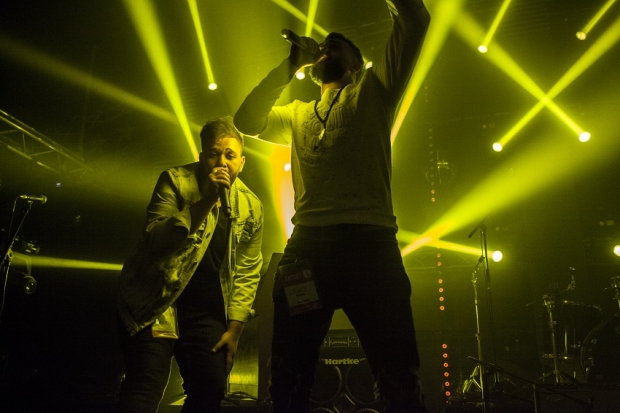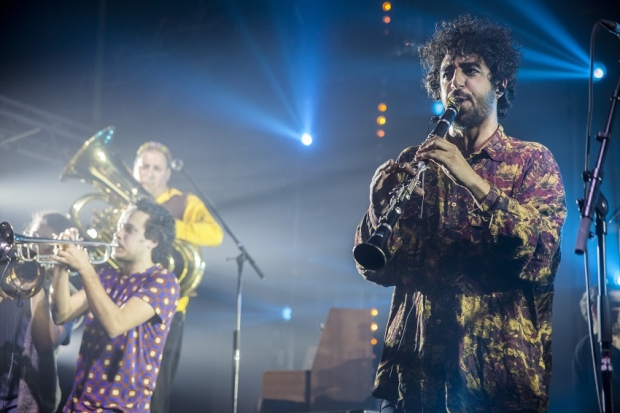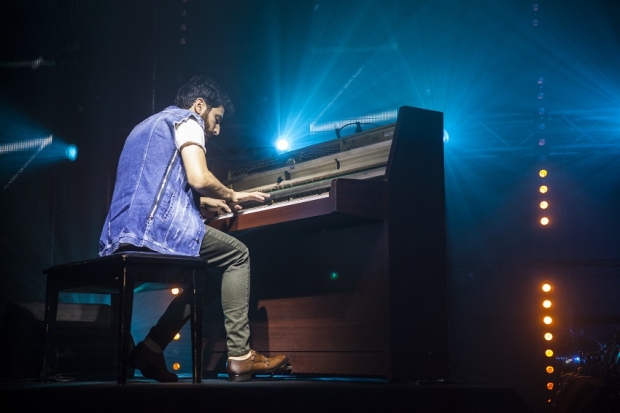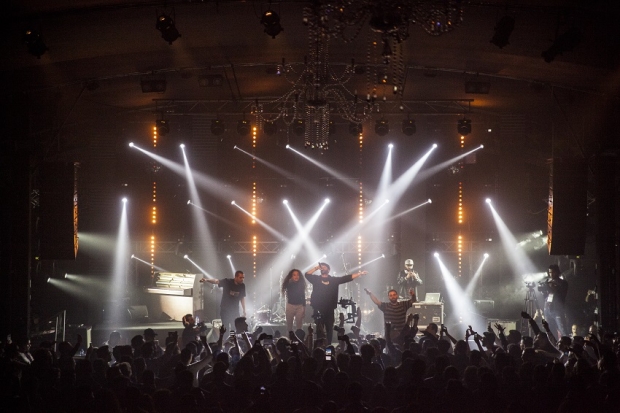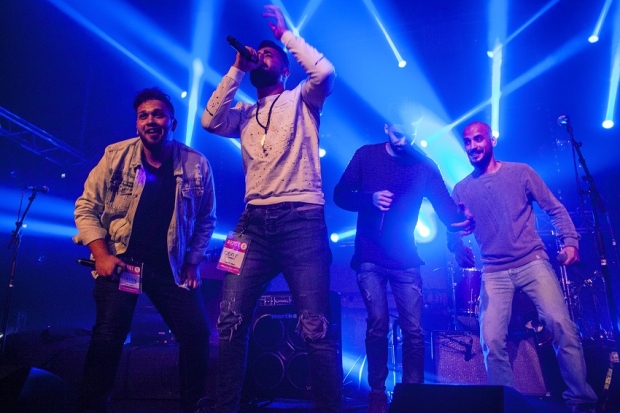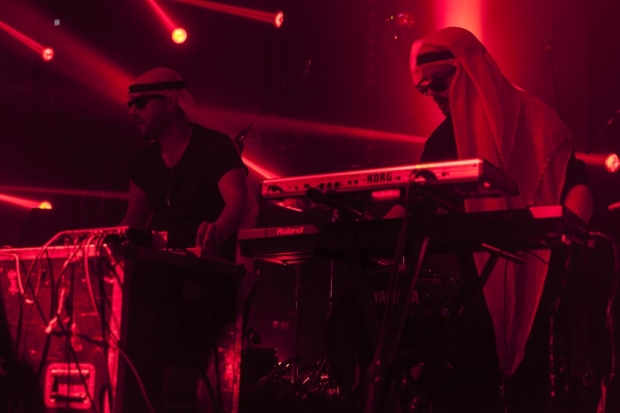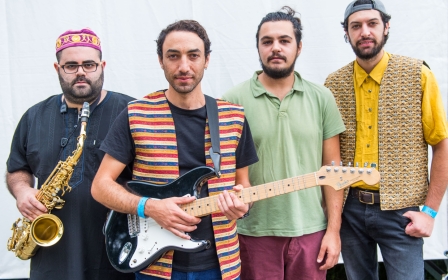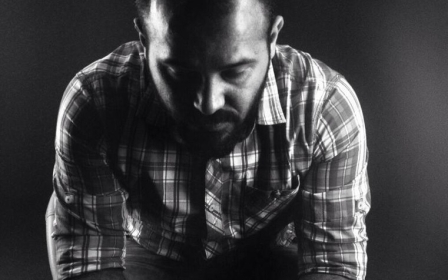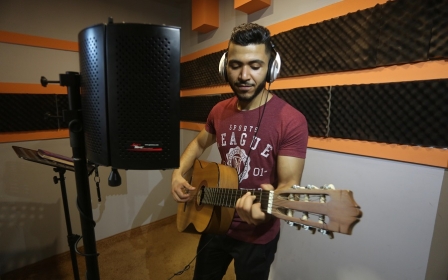Hearing is believing: Music industry flocks to see Palestine's music talent
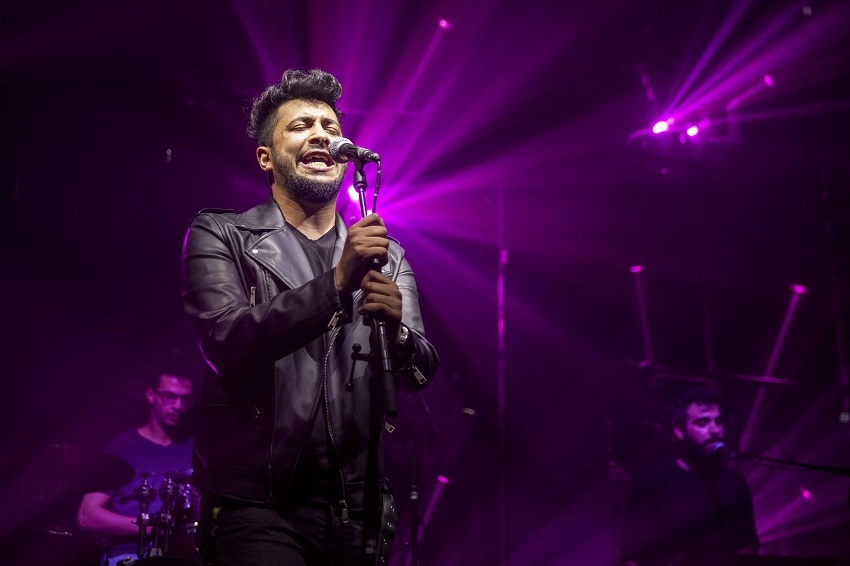
RAMALLAH, Occupied West Bank - In the grounds of the Grand Park Hotel in Ramallah, local hip-hop group Sawa Sawa take to the stage in a tent pulsating with energy and bright lights.
The four MCs in the band perform in front of a crowd of young Palestinians who have travelled from around the West Bank and cities within Israel such as Haifa to see the group play live at the Palestine Music Expo (PMX).
I imagine Palestinian artists have a lot to say
- Caius Pawson, founder of Young Turks
Now in its second year and taking place from 11-13 April, PMX aims to provide a platform where both established and up-and-coming Palestinian musicians can perform in front of international music industry representatives.
“The idea is to bring people together from the refugee camps, the cities and the villages, and gather them together in one place,” explains band member MC Mohammad Hammoud (Hamoody), 22, who lives in the Shufat refugee camp in Jerusalem. “All of us have one identity. We are Palestinian.”
[In 48] we don’t take from the Palestinian Authority and we don’t take from the Israelis, for ideological reasons mainly, and because we don’t want to submit to limits and conditions
- Jowan Safadi, Fishsamak
The members of Sawa Sawa, which means together in Arabic, formed the band in the summer of 2017, explained Hamoody.
The band wants to spread a message of solidarity across Palestine, at a time when tensions are rising among Palestinian factions.
Fellow band member Fadi believes the Israeli occupation makes it difficult for Palestinians to come together as one, because of the lack of freedom of movement.
Bringing the community together
Sawa Sawa’s message chimes with the concept behind PMX. Many of the bands performing this year come from '48 cities, cities which were occupied by Israel after the Nakba (the catastrophe) of 1948, when the state of Israel was established and hundreds of thousands of Palestinians were made refugees.
A video of a performance by the Palestinian rapper MC Gaza was also shown on the expo's opening night, made during the Great March of Return protests in Gaza calling for the Palestinians' right of return.
Filmed as tyres were set on fire by Palestinians to create smoke in which they could hide from Israeli snipers, the video drove home not only how difficult it is to be a musician in Palestine, but also why music can be cathartic for people under occupation.
A group of music industry professionals mainly from the UK travelled to Palestine for last year's expo, in order to network with local musicians and share their knowledge.
Isla Angus, who books bands at ATC Live, an independent agency based in London that represents musicians such as Mac Demarco and Aldous Harding, was in attendance at the inaugural PMX event last year and after a “brilliant time,” she returned this year.
“It’s about facilitating fledgling and budding music industry professionals within Palestine to build their own network,” she said.
Finding tools to develop
Caius Pawson, the founder of Young Turks, a British independent record label home to artists such as FKA Twigs, was also in attendance at PMX. “The thing I’m shocked about is how developed the scene is and how well facilitated these artists already are. It’s already a thriving industry,” Pawson said.
“From the ground up you need scenes, you need artists able to work together and create support networks,” he said, referring back to Sawa Sawa’s message.
He also went on to say having venues and appropriate licensing, from the top down, is just as important to enable members of these local networks to meet and work together.
The idea is to bring people together from the refugee camps, the cities and the villages
- MC Mohammad Hammoud, Sawa Sawa
For Hamoody, this is a major stumbling block in Palestine. “We want to deliver a message and [you can’t do this] unless you have contact with people when you perform,” Hamoody explained.
Jowan Safadi is the front man of Arabic grunge band Fishsamak, from Haifa. Their music is a lot heavier and louder than many of the bands scheduled to play at PMX 2018.
“To find a suitable venue for punk rock or loud music… is really hard, or to find the right qualified people to do your sound... because it’s all new,” Safadi explained to Middle East Eye.
“This whole scene, and openness to different kinds of music, it’s recent, in the last 10 years,” he added.
Opportunities, restrictions
Safadi described last year’s PMX as a “turning point for many Palestinian musicians”. Palestinian artists can take advantage of opportunities to take their music overseas by meeting with international music industry representatives, booking agents and record labels.
Many bands were also picked up by booking agents. TootArd, a band from the Golan Heights who play a mix of blues, psychedelia and reggae, were booked by Isla Angus from ATC Live for a string of dates around the world.
“The more people we have playing on stages in Europe, the more it will encourage people here [in Palestine] to go into music,” Younis added.
But even with a booking agent, tours are difficult to organise because of restrictions on the freedom of movement even for people living in the occupied Golan Heights.
Younis only holds a laissez passer document since Syrians from the occupied Golan Heights don’t hold Israeli citizenship, and permits and visas are often hard to acquire.
Some of those living in the besieged Gaza Strip have barely travelled outside of it.
“What makes it easier is putting together tour dates which allows acts to obtain invitation letters and get visas. Without a bunch of dates booked, you have no chance of getting a visa to travel to any country,” Angus said.
“In many parts of the world, the main focus is making money from touring, and of course because of the geographical [and political situation] the touring opportunities are pretty limited,” she added.
Music under occupation
As Safadi from Fishsamak points out, there is also a lack of government support for the arts.
“The whole thing we’re doing here is underground. The state has nothing to do with it,” Safadi said. “[In 48] we don’t take from the Palestinian Authority [governing the West Bank] and we don’t take from the Israelis, for ideological reasons mainly, and because we don’t want to submit to limits and conditions. We don’t want to follow their blueprint, basically. Everything we want to do, we have to invent it.”
Younis echoed this sentiment: "When you have a nation under occupation, you prioritise things, you worry about your livelihood."
When you have a nation under occupation, you prioritise things, you worry about your livelihood
- Rami Younis, co-founder of PMX
“If they find… the conditions to allow them to do it, they might make something quite great," Pawson added. "I imagine Palestinian artists have a lot to say.”
Despite the heavy toll the Israeli occupation is taking on the lives of the Palestinians, many of the industry professionals in attendance at PMX wish to view the Palestinian musicians in their own right, not letting their circumstances define them.
“Ultimately, the whole point of PMX is to further the Palestinian music scene, so strictly speaking, no one needs to know anything about ([the political situation]; they just need to be able to see a Palestinian act [perform]... and think ‘I can facilitate something for this artist’,” Angus said.
Middle East Eye propose une couverture et une analyse indépendantes et incomparables du Moyen-Orient, de l’Afrique du Nord et d’autres régions du monde. Pour en savoir plus sur la reprise de ce contenu et les frais qui s’appliquent, veuillez remplir ce formulaire [en anglais]. Pour en savoir plus sur MEE, cliquez ici [en anglais].


